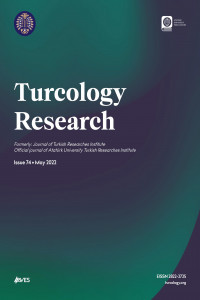About the Turcology Research
Turcology Research is a peer reviewed, open access, online-only journal published by the Atatürk University Turkish Researches Institute.
Turcology Research is a triannually journal that is published in Turkish (and other Turkic language), English and Russian (or Cyrillic) with articles in January, May, and September.
Journal History
As of 2022, the journal has changed its title to Turcology Research.
Previous Title (1994-2021)
Atatürk University Journal of Turkish Researches Institute
ISSN: 1300-9052
EISSN: 2717-6851
Current Title (2022-…)
Turcology Research
EISSN: 2822-2725
Turcology Research is a peer reviewed, open access, online-only journal published by the Atatürk University Turkish Researches Institute.
Turcology Research is a triannually journal that is published in Turkish (and other Turkic language), English and Russian (or Cyrillic) with articles in January, May, and September.
Journal History
As of 2022, the journal has changed its title to Turcology Research.
Previous Title (1994-2021)
Atatürk University Journal of Turkish Researches Institute
ISSN: 1300-9052
EISSN: 2717-6851
Current Title (2022-…)
Turcology Research
EISSN: 2822-2725
2024 - Issue: 79
Research Article
Tuva Türklerinin Cenaze ve Anma TörenleriContent of this journal is licensed under a Creative Commons Attribution NonCommercial 4.0 International License


